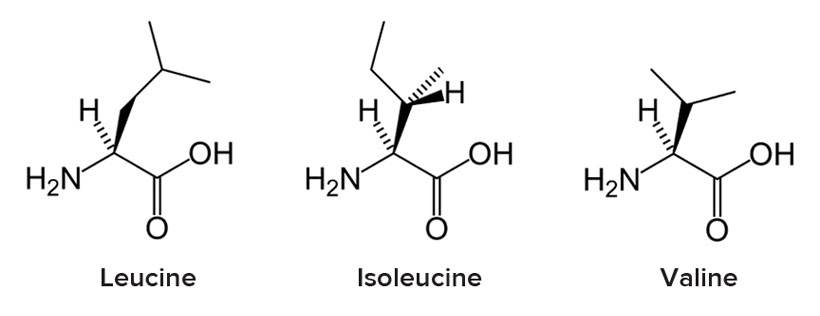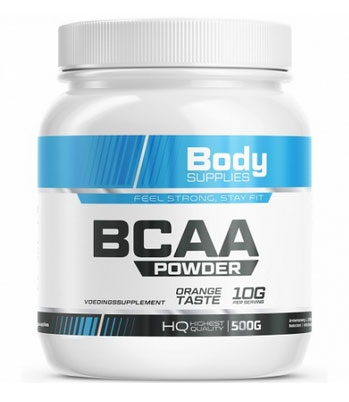- Like
- SHARE
- Digg
- Del
- Tumblr
- VKontakte
- Flattr
- Buffer
- Love This
- Save
- Odnoklassniki
- Meneame
- Blogger
- Amazon
- Yahoo Mail
- Gmail
- AOL
- Newsvine
- HackerNews
- Evernote
- MySpace
- Mail.ru
- Viadeo
- Line
- Comments
- Yummly
- SMS
- Viber
- Telegram
- JOIN
- Skype
- Facebook Messenger
- Kakao
- LiveJournal
- Yammer
- Edgar
- Fintel
- Mix
- Instapaper
- Copy Link
 Branched-chain amino acids (BCAAs) are the building blocks for protein. BCAAs get their term from their structure that includes a side chain of three hydrogen atoms and one carbon atom.
Branched-chain amino acids (BCAAs) are the building blocks for protein. BCAAs get their term from their structure that includes a side chain of three hydrogen atoms and one carbon atom.
BCAAs come in three forms: valine, isoleucine, and leucine. Leucine appears to be the most widely researched and bears the biggest physiological benefit. BCAAs provide the basis of energy production and protein synthesis. Actually, they make up a third of muscle protein.
As a result of their active role in energy production and protein synthesis, BCAAs are critical in a number of metabolic processes. However, for BCAAs to take part in these processes, then to make them available in the body, we must eat enough of them, and at the right times.
How Do BCAAs Work?
 BCAAs make up a huge portion of the total amino acids in the human body. Combined, they make up about 35-40% of essential amino acids in your body and about 14-18% of amino acids present in your muscles.
BCAAs make up a huge portion of the total amino acids in the human body. Combined, they make up about 35-40% of essential amino acids in your body and about 14-18% of amino acids present in your muscles.
As opposed to most other amino acids, they are majorly broken down in the muscles rather than in the liver. This is why they are thought to be helpful in energy production when you exercise.
BCAAs also play other roles in the body. Your body can use BCAAs as substrates for muscles and protein. They can also participate in regulation of blood sugar levels by preserving muscle and liver sugar stores therefore triggering your cells to consume sugar in the bloodstream.
What Are BCAA Supplements Used For?
 You can use BCAA supplements to reduce fatigue as you exercise. BCAAs have been proven to reduce both mental and physical fatigue.
You can use BCAA supplements to reduce fatigue as you exercise. BCAAs have been proven to reduce both mental and physical fatigue.
Studies involving human participants have reported up to 15% less mental and physical fatigue for those put under BCAAs during workouts, compared to participants given a placebo.
In another study, increased fatigue resistance helped the BCAA group work out 17% longer before exhaustion compared to their counterparts in the placebo group.
BCAAs have also been proven to be effective in reducing muscle soreness. This is possible by lowering blood vessels of lactate dehydrogenase and creatine kinase enzymes that take center stage in muscle damage. BCAAs will therefore help recovery from a strenuous workout and protect your muscles from damage.
What is BCAA Powder?
 This is a BCAA supplement in powder form that is becoming really popular among gym enthusiasts and athletes to enhance exercise performance and promote muscle growth.
This is a BCAA supplement in powder form that is becoming really popular among gym enthusiasts and athletes to enhance exercise performance and promote muscle growth.
The powder can help you shed off weight pretty fast and recover well after a strenuous workout too. Taking the powder is easy too, not too much different than protein or other supplements you are likely already taking.
The powder dosage is different for both men and women. Mix about 3-5 grams of the powder with water for a one-day serving if you’re female. A maximum of 12 grams is allowed per day for women doing more strenuous workouts.
Men can mix about 15-20 grams of this powder with water or a sports drink for a one-day serving. Men doing strenuous workouts can serve up to 40 grams.
Always be sure to stick to the manufacturer specifications and don’t exceed the recommended dose.
The Bottom Line
Working out can expose you to muscle damage and a steep recovery path. BCCAs should help you get back on your feet after extreme exercise. Just make sure you don’t exceed the recommended dose of BCAA powder and always consult your doctor before introducing a new supplement to your overall nutritional plan, BCAAs included.
About Shannon Clark
Shannon holds a degree in Exercise Science and is a certified personal trainer and fitness writer with over 10 years of industry experience.

